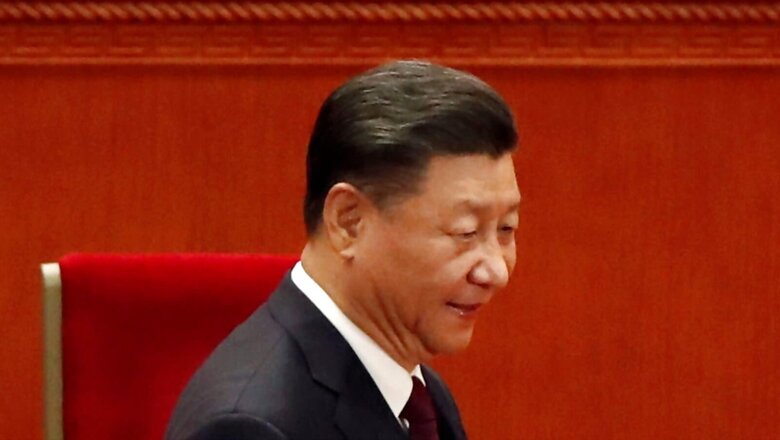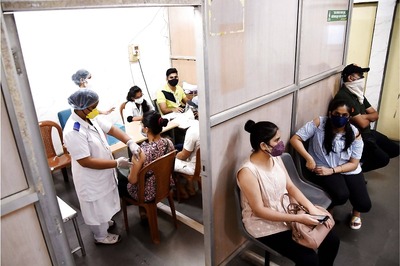
views
Just what is happening in China? Since last October, the CPC-led government has initiated crackdowns on some of China’s most vibrant sectors like technology and education and their world-class companies.
On July 26, the government announced the launch of a special six-month campaign to regulate its internet industry. Xinhua said that the campaign “targets problems that may disrupt market order, damage consumer rights, or threaten data security”. On Tuesday, internet giant Tencent announced that its popular WeChat social network had suspended registrations so that the company can align “with all relevant laws and regulations”. Not surprisingly, its shares sank in the Hong Kong market. The tactics that were used to keep foreign firms in control are now being freely deployed against companies like the ride-hailing giant Didi, Tencent, Alibaba, Meituan, and others. According to Bloomberg, losses in Chinese technology and education stocks now exceed US $1 trillion since February.
Last week, the Chinese market regulator barred Tencent from exclusive rights in online music and fined the company for unfair market practices. On July 22, China’s Ministry of Human Resources and Social Security and eight other departments issued guidelines on safeguarding labour rights of “new employment workers” (the so-called gig workers) suggesting that food delivery and ride-hailing companies needed to act to provide them social security such as pensions, medical care, and industrial injury protection.
Amongst the first targets was China’s top food delivery platform, Meituan, which has been ordered to ensure that their workers earn at least the local minimum wage. The company’s stock tumbled 50 per cent since this was not the only area of the company that is under scrutiny.
It began last October with Jack Ma, the co-founder of Alibaba, one of the world’s largest e-commerce firms. His criticism of Chinese regulators led to a cancellation of the Ant Group’s—the world’s largest fintech company—US $34 billion initial public offering. In April this year, a fine of US $2.8 billion was levied on the company for its practice of forcing its e-commerce merchant partners to work with it exclusively and effectively preventing them from working with rivals JD.com or Pindouduo. Even now, it is not clear just what is happening to Alibaba or where Jack Ma is.
ALSO READ | China is Planning Its Own Regional Security Dialogue to Counter Quad
Last week, it was reported that regulators were considering penalties on Didi, the ride-hailing giant on issues relating to how its collects user data. The company had recently raised US $4.4 billion in the New York Stock Exchange over the objections of the Cyberspace Administration of China. Now the company is expecting penalties which could be more severe than the ones imposed on Alibaba. Earlier in July, China’s Cyberspace Administration had ordered online stores not to offer Didi’s app, saying it was illegally collecting user’s personal data.
The most dramatic crackdown has been on the country’s US $100 billion private education industry, which has been gutted wiping out billions in investment by a slew of major Western investors like BlackRock, Sequoia, as well as domestic investors like Tencent. The Chinese government has decided that private tutoring can no longer be a “for profit” enterprise and access public market financing. The authorities say that this is aimed at reducing the burden of students who undergo nine years of free and compulsory education—six years of elementary and three years of middle school.
Emergence of “Regulatory Authoritarianism”
We seem to be witnessing the onset of an era of what The Economist terms “regulatory authoritarianism”, and no one has an idea as to why. The value of China’s five top internet firms has gone down by an estimated US $153 billion. The fines certainly hurt, but more damaging are issues raised which could gut the very business models of many of the companies.
These developments, many coming to the fore in the past two weeks, have led to rumours that the US funds are offloading China and Hong Kong assets, as a result, the markets crashed in Hong Kong on Monday. Investor confidence is clearly fragile and there may be a large-scale exodus of foreign capital out of the Chinese stock and bond market. This could well trigger political instability in China, something that the CPC dreads the most. But clearly, it is betting on its ability to ride things out, or, perhaps, it feels it has no alternative.
For the CPC, the Maoist dictum of keeping “politics in command” is a key driver for strengthening the role of the CPC in the lives of the Chinese. The party itself believes that it is working on Marxist-Leninist principles having identified the current principal contradiction as being “between unbalanced and inadequate development and the people’s ever-growing needs for a better life.” This, at one level, is what is giving the push for the moves to improve the status of an estimated 84 million gig workers and push the state towards equalising the educational opportunities of the young. There seems to be a belief that the private sector has exacerbated inequality and was undermining China’s socialist goals.
ALSO READ | As CCP Turns 100, Xi Jinping Must Know That No Country Can Singlehandedly Take on the World
But the larger goal is political control. The CPC had, in 2013, acknowledged that the market had to play a decisive role in the allocation of resources. Yet, what we are seeing is a sustained attack on market forces. This is on account of the understanding that a larger role for the market may see greater economic efficiency, but also lead to a loss of political control by the CPC. Xi has marked out a special place for himself as a CPC leader who has insistently called for a greater role of the Party in every aspect of Chinese life.
The crackdown could have a long-term impact on Chinese efforts to become a technology superpower riding on the back of innovation. The private sector contributes more than 60 per cent of Chinese GDP and 80 per cent of the jobs in the country. It is also responsible for contributing more than 70 per cent of technological innovation in the country. Refusal to push through the marketisation reforms have had a negative impact on the Chinese economy. According to one calculation, the Chinese economy has become less efficient since Xi came to power in 2012, with the amount of capital needed to generate one unit of economic growth nearly doubling.
Parallel to all these developments has also been the effort to install the presence of the CPC in private firms. Since Xi took over, the number of firms with CPC units has grown sharply. The aim is to get the proprietors and the staff to hew close to the party line. The obvious consequence of this is that since the CPC is the ruling party, this will tend to blur the difference between the private and the government sector. But the bottom line seems to be that the CPC under Xi simply distrusts the private sector and is determined to keep it under control. China’s success in riding out the COVID pandemic through state planning and centralised directives seems to have reinforced this belief.
This article was first published on ORF.
The author is a Distinguished Fellow at the ORF. The views expressed in this article are those of the author and do not represent the stand of this publication.
Read all the Latest News, Breaking News and Assembly Elections updates here.




















Comments
0 comment